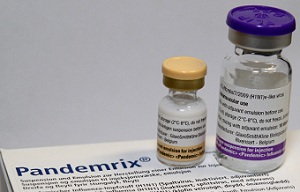For years now, evidence has been mounting that a GlaxoSmithKline ($GSK) flu vaccine may have caused narcolepsy in nearly 800 Europeans who received the shot. Now the jab's adjuvant--designed to boost the potency of the vaccine--is under the microscope as the potential cause of the spike in cases of the sleeping disorder.
 |
| Pandemrix--courtesy of Wikimedia Commons |
The booster, AS03, was added to GSK's Pandemrix during the 2009-2010 H1N1 flu pandemic. Some experts say AS03 may have had an adverse effect on patients, in addition to the good immune response the adjuvant generated.
"The adjuvant in the Pandemrix vaccine is very potent and we think it may have played a role," Markku Partinen, a neurologist at the Helsinki Sleep Clinic in Finland, told Reuters. Partinen has spent the past few years studying the potential link between the vaccine and narcolepsy.
Studies from Sweden, Finland, Ireland and Britain all indicate that the risk of developing narcolepsy is between 7 and 13 times higher in kids immunized with Pandemrix than in those who did not get the shot, the news service reports. Many of the 800 cases reported throughout Europe are in children.
GSK, for its part, accepts this evidence but wants to see more research as to whether the vaccine's components actually caused the sleeping disorder.
"There is absolutely no doubt that people vaccinated with our vaccine were shown in published studies to be more likely to develop narcolepsy than people who were not," Norman Begg, chief medical officer at GSK's vaccine division, told Reuters. "As a statistical association that's clear. It's a very different thing, though, to say that then means A causes B."
Pandemrix is not licensed in the United States, a country long wary of adjuvants in vaccines. More than 30 million people in 47 countries received Pandemrix during the 2009-2010 pandemic.
- get the full story from Reuters